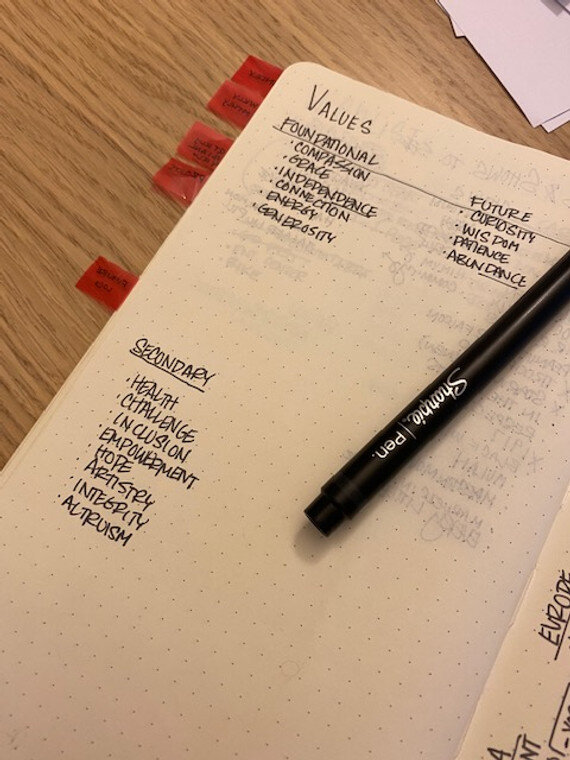Self-Coaching Activity: 6 Ways to Mine for Values
At some point in your life, you might have said to someone, "We share similar values," or, "We simply have different values."
Values can be a fuzzy subject, so let's take a moment to break them down in a way that can improve self-awareness, decision-making, and relationships with others.
Values are what drives us. Put literally, values are what we uniquely assign value to in our lives. While your core values are unique to you, they may not always show up in an obvious way. In a workshop led by Mary Elizabeth Lynch and Mark Thurston from the Personal Transformation and Courage Institute, I learned that some values are natural and others are secondary. And then there's a category of values that we have but find challenging to actualize. Those may be thought of as aspirational or "future" values. When you're aware of your values, you can make effective choices.
What will serve you in one scenario may not serve in another. For example, compassion and caring are very natural values for me. They serve me as a facilitator and coach, helping me notice when someone is not speaking up and might be feeling left out.
Here's another example. A "future" value, or one that I need to work a little harder at, is patience. My work has shifted greatly as a result of COVID-19. I used to get most of my leads from being onsite with clients and through word-of-mouth referrals. In a virtual world, I'm having to do a lot more online marketing. Building a social media following takes time to generate leads that result in new revenue sources. It takes effort and intention from me to practice patience in the process, but that is the value that will serve me best right now.
Here are a few techniques to help you mine for, better understand, and utilize your values when they will serve you best.
Appreciation: One way to identify values is to ask ourselves, "What do others appreciate me for?" Think about the last time you received an appreciative note, special kudos or a thank-you from a friend. Sometimes others notice and recognize our strengths before they are obvious to us.
Michelle received this email from her co-worker. "Michelle, I really appreciate your eye for detail. When you review my newsletters, I know that you're putting yourself in the readers' shoes. You seem to really care about how someone might read and interpret each word."
This example shows that Michelle might value detail and compassion for the perceptions of others.
Conflict: Values emerge clearly in times of conflict. The things that trouble or burden us may be pointing to a value in question. Think about the last time you had a personal conflict over an event or interaction. If you can think past the anger or sadness, ask yourself, "What value may have been pinched? What was important to me that was not honored?" By documenting when values show up, we name what is happening and can now have more control over how much we are affected and what choices we make as a result.
Julian gets angry when he is told at the last minute that he will need to work this weekend. He is sure that his team could have prepared him for this change days ago.
This example shows that Julian might value transparency and timeliness.
Relationships: Values also show up in our relationships. You may notice that you tend to start friendships with people who exhibit certain qualities. What behaviors or qualities do many of your friends show? What do you admire about your friends?
Barbara finds herself drawn to people who "go deep" and have open, honest conversations about their feelings.
This example shows that Barbara might value empathy and open-mindedness.
If we get good at understanding our values, we can share them with others, so that they can better relate to and work with us. Consider what someone needs to know about you to work well with you.
Samantha is meeting her new team-member Dave. They shake hands, and after a few exchanges, Dave asks Samantha, what could she tell him about herself that would help them work together? She replies, "It might help you to know that open communication and patience are really important to me. If I have those things, I know I can work well with you."
In this example, Samantha is letting Dave know that open-communication and patience are valuable to her, and honoring those values will enable an effective working relationship.
Situations/Decision-Making: Values may emerge as themes in how you make decisions. What do you say yes to and why? What do you say no to and why? Think about a recent decision you made. What seemed important to you in making that decision? Who did you consider? What "sealed the deal"?
Marcus thinks about a recent decision in which he declined a job offer. The offer would have been good money, but he didn't feel good after the interview. Sandra, the interviewer, grilled Marcus about his experience and didn't ask if he had any questions about Sandra's team.
This example shows that Marcus may value curiosity and teamwork. By deciding not to take the role, he may have been holding space for values that were more important to him than the money.
The Body Knows: There is wisdom in our bodies that we rarely tap into, except during our weekly Yoga classes. A practiced "Yogi" is able to pick up on tensions and quirks in their bodies, clues that something isn't sitting quite right, physically and spiritually. You might notice that when you feel stress, your shoulders become tight, but a short walk around the block leaves you feeling energized and renewed.
Our bodies tell us when when we need food, and they also tell us when we have a value in question. Think about a time when someone told you something that they appreciate you for? What is happening in your body? Think about a time when you’ve felt insecure or stressed? What is happening in your body now?
Natalia's boss won't stop texting her. He doesn't seem to trust that she is hard at work. Each ping causes the tightness in her chest to increase. Then Natalia's daughter runs in to show her a picture she drew. The tightness relaxes and her heart feels light. She puts down her phone and spends a few minutes admiring her daughter's artwork.
This example shows that Natalia may value quality time and trusting relationships. The tightness in her chest may point to her value of trust being questioned. The lightness in her chest when her daughter gave her the picture made her remember that time with family was more important.
A Values Sort: And if you really get stuck, James M. Kouzes and Barry Posner, authors of The Leadership Challenge , offer the following list of values that you can choose from. Looking at this list, circle any that you feel pulled to. Consider situations where these values showed up prominently. Then scale the list down to your top five or 10. There is also a values sort card game .
Connecting Values, Limitations and Limiting Beliefs
In Leading from the Inside Out , Cashman talks about the link between values and limitations. When a shadow belief or negative mindset is in play, it can cause our values to show up as bad behaviors. For example, I value compassion for others, but when I tell myself that, "I have to be right," I might show up to others as controlling. If you're a mother, you might relate to this feeling.
Once I mined for a few values, I began thinking about my own limiting beliefs and constructive feedback I had gotten. Then I realized, it was all connected. When I was telling myself a negative story, my value wasn't showing up in a positive way, and sometimes, it worked completely against me.
Home-joy
In a journal or place where you take notes, use one or more of these mining techniques to start making a list of values, as you go about your life over a few days or a week.
Then, group similar values together, choosing between five and 15 values that feel very important to you.
If you're feeling ambitious, create these three columns and group your values accordingly:
Foundational: Values that are core to you and may feel like they are "always on."
Secondary: values that are important but not central to you; they are "sometimes" values.
Future: values that are important to you but that you struggle with in some way.
Keep this list nearby. Next time you find yourself in conflict or with a big decision to make, identify three values that you think might serve you.
For each one, ask yourself, "If I honored this value, what might I do or say?"
Choose the action that you think might serve the situation best, and take it.
Reflect on how it went. What worked? What might you do differently? What other value(s) may be needed?
BONUS: Start mining your limiting beliefs and see if you can connect them to your values!
This article may contain affiliate and/or compensated links. For more information, please read our disclosure here.
If you enjoyed this article, please subscribe to our blog to receive email notifications whenever we post, and check out our events page for our coaching and workshop schedule.
You may also like to read these Self-Coaching blogs:
DONATE:
If you loved this blog and want us to continue offering content like this, please consider donating to Dancing with Markers via PayPal.





